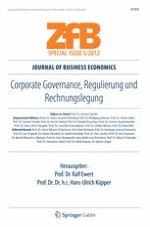01.09.2012 | ZfB-Special Issue 5/2012
Decision-usefulness of ideal cost- and ideal value accounting for valuation and stewardship
Erschienen in: Journal of Business Economics | Sonderheft 5/2012
EinloggenAktivieren Sie unsere intelligente Suche, um passende Fachinhalte oder Patente zu finden.
Wählen Sie Textabschnitte aus um mit Künstlicher Intelligenz passenden Patente zu finden. powered by
Markieren Sie Textabschnitte, um KI-gestützt weitere passende Inhalte zu finden. powered by
